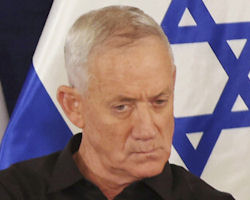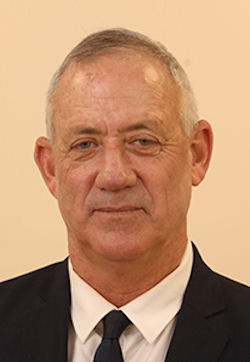Benjamin (Benny) Gantz
 Benny Gantz, a centrist member of Israel’s war cabinet and a popular former military chief, announced his resignation 09 June 2024. The move did not immediately pose a threat to Prime Minister Benjamin Netanyahu, who still held a majority coalition in parliament, but Bibi became more heavily reliant on his far-right allies. Gantz had joined Netanyahu’s government shortly after the October 7 Hamas attack in a show of unity on October 7, the day Hamas led attacks on southern Israeli communities. In his resignation statement, Gantz emphasised that ‘Netanyahu is obstructing important strategic decisions for political considerations,’ stressing that ‘our withdrawal from this government comes because Netanyahu is preventing us from advancing towards real victory.’
Benny Gantz, a centrist member of Israel’s war cabinet and a popular former military chief, announced his resignation 09 June 2024. The move did not immediately pose a threat to Prime Minister Benjamin Netanyahu, who still held a majority coalition in parliament, but Bibi became more heavily reliant on his far-right allies. Gantz had joined Netanyahu’s government shortly after the October 7 Hamas attack in a show of unity on October 7, the day Hamas led attacks on southern Israeli communities. In his resignation statement, Gantz emphasised that ‘Netanyahu is obstructing important strategic decisions for political considerations,’ stressing that ‘our withdrawal from this government comes because Netanyahu is preventing us from advancing towards real victory.’
The former minister in the War Cabinet also indicated that he ‘supports the deal offered by US President Joe Biden, who asked the Prime Minister to have the courage to make it work.’ He told the families of the prisoners: ‘We failed the exam and were unable to return your sons, and all efforts must be made for the deal offered to recover the kidnappers.’ Gantz added: ‘The war in Gaza is long and will continue, and I call on Defence Minister Yoav Galant to be brave and make the right decisions.’ He also called on Netanyahu to call for elections as soon as possible and form a national investigation committee, stressing the need for elections to bring in a government of true national unity.
Israeli war cabinet minister Benny Gantz’s centrist party on 30 May 2024 called for holding a parliamentary vote on dissolving the Knesset, but it was unclear whether he has enough support to bring about early elections. Gantz’s centrist bloc split up in March 2024, and his party did not on its own control enough seats in parliament to bring down the ruling coalition. The move followed the ultimatum that Gantz issued demanding Prime Minister Benjamin Netanyahu agree to a plan for post-war Gaza by June 8. He threatened to quit the coalition if no such plan was forthcoming. Following the rescue of four hostages, Gantz delayed by one the statement he was due to give in which he was widely expected to announce his resignation.
Netanyahu’s right-wing Likud party countered: “The dissolution of the unity government is a reward for [Hamas leader Yahya] Sinwar, a capitulation to international pressure and a fatal blow to efforts to free our hostages”. It added that Israel needs unity and disbanding the government would hurt the war effort. Israel’s assault on Gaza has been met with widespread global condemnation as the Palestinian death toll had exceeded 36,000 and continued to mount.
 Generals are revered in Israel, though many who cross into political life after their military service discover that their army experience does not always prepare them for the challenges of civilian decision-making. Former Israeli military chief Lt.-Gen. (res.) Benjamin (Benny) Gantz launched himself into politics in December 2018 with opinion polls suggesting his new party, Israel Resilience, could win a signficant number of seats. Gantz was military chief of staff from 2011-15, during two wars in the Gaza Strip. According to official party registration documents, Israel Resilience aims at "strengthening the Jewish and democratic character of the state of Israel".
Generals are revered in Israel, though many who cross into political life after their military service discover that their army experience does not always prepare them for the challenges of civilian decision-making. Former Israeli military chief Lt.-Gen. (res.) Benjamin (Benny) Gantz launched himself into politics in December 2018 with opinion polls suggesting his new party, Israel Resilience, could win a signficant number of seats. Gantz was military chief of staff from 2011-15, during two wars in the Gaza Strip. According to official party registration documents, Israel Resilience aims at "strengthening the Jewish and democratic character of the state of Israel".
Benny Gantz was born in 1959 to Malka, a survivor of the Bergen-Belsen concentration camp, and Nahum Gantz. After World War II, his parents came to Israel on a ship of illegal immigrants and were among the founders of Kfar Ahim in the south of Israel. He was raised in the small moshav (cooperative farm) in central Israel alongside his three sisters. As a youth, Gantz attended the Or Etzion religious high school in Merkaz Shapira, and he later attended the boarding school at the HaKfar HaYarok youth village.
At age 18 Gantz enlisted in the Paratroopers Brigade and served in the Airborne Nahal battalion. His first assignment was serving in the security detail for Egyptian president Anwar Sadat’s historic visit to Israel. He was sent to officers’ training course, which began his 38 years of service as an IDF commander. Ten years after his enlistment, at just 28 years of age, Gantz was appointed commander of the 890th battalion of the Paratroopers Brigade.
Gantz rapidly rose through the IDF’s ranks, advancing so fast that he was nicknamed “the Prince.” In 1979, he graduated from the IDF officer school and was positioned as company commander and later Platoon commander in the Paratrooper Brigade. At age 30, in 1989 he was appointed commander of the Shaldag Unit in the Israel Air force. In this position, he led the historic Operation Solomon—the airlift of Ethiopian Jews to Israel. His next position took him back to the Paratroopers Brigade, this time as brigade commander. In 1994 he was appointed commander of the Judea Brigade in the Judea and Samaria Division.
In 1989 he was appointed commander of the Shaldag Unit in the Israel Air force. In 1994 he was appointed commander of the Judea Brigade in the Judea and Samaria Division. In 1997 Gantz left for an academic break in the United States. In 1999 he was appointed as commander of the Liaison Unit with Lebanon. In 2000 he was appointed as commander of the Judea and Samaria division.
In 2000, the government decided to withdraw from Lebanon. Gantz, who was serving as commander of the Lebanon Liaison Unit, was the last IDF officer to exit Lebanon. A year later he was promoted to Major General and was appointed Commander of the IDF Ground Forces. Subsequently, he was appointed GOC Northern Command.
In 2005 he was appointed as commander of the IDF Ground Forces Command. From 2007-2009 he served as the IDF Military Attaché in the United States.
In 2009 he was asked by the Minister of Defense and the Chief of the General staff to serve as the Deputy IDF Chief of General Staff, a position he filled until November 2010. During this period, Gantz implemented the Tefen multi-year plan in addition to leading other processes in the reserve forces, human resources, the IDF budget and numerous others.
In February 2011, Lt. Gen. Benny Gantz was appointed to serve as the 20th Chief of the General Staff of the IDF, a position he held until February 2015. Gantz was an unexpected choice to be named as the IDF’s chief of staff – he was a compromise figure who was picked by Prime Minister Benjamin Netanyahu after two more favored candidates became mired in scandal. During his term as Chief of General Staff, Gantz commanded Operation Pillar of Defense, which opened with the assassination of mass murderer Ahmed Jabar. In July 2014, he commanded Operation Protective Edge, during which the offensive tunnels from the Gaza Strip were destroyed. The IDF was criticized for the hundreds of civilian casualties during those two wars, but Gantz defended himself by citing Hamas’s tactics of embedding in civilian areas and praised the IDF’s efforts to avoid deaths.
In late 2014, after 38 years in the IDF, Gantz completed his military service. Following his release, Gantz was involved in social activities and participated in various projects: he served as chairman the Public Advisory Board of NATAL Israel and as chairman of Yad David Ben-Gurion; he initiated and led the MadaNegev program, which exposes the children of Yeruham to the fields of science and technology, so that the program's graduates can enter the fields of robotics, technology, and innovation.
In December 2018 Gantz established his own party, which he named the Israel Resilience Party (Hosen L'Yisrael), to run in the 2019 general elections. In January 2019, he announced an electoral alliance with former minister of defense and IDF Chief of Staff Moshe Ya'alon and his Telem Party. In February the two parties merged with Yesh Atid and created a united list known as the Blue and White Party (Kahol Lavan). Gantz was elected to the 21st Knesset in April 2019 as head of the Blue and White Party.
Gantz is a graduate of the Command and Staff College and the National Security College, has a Bachelors degree in history from the Tel Aviv University, a masters degree in Political Science from the Haifa University and another Masters Degree in management of national resources from the NDU university in the United States. Gantz lives in Rosh HaAyin with his wife Revital, who runs the Nitzan Association's Parent Training Center, and his four children: Nadav, Noga, Nir and Noam.
|
NEWSLETTER
|
| Join the GlobalSecurity.org mailing list |
|
|
|

